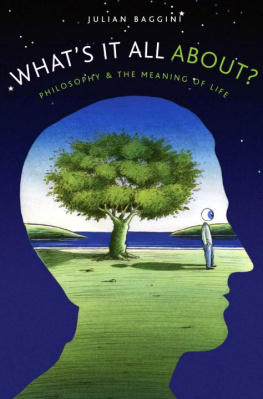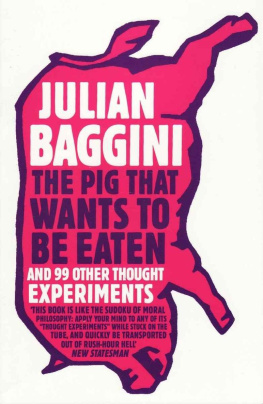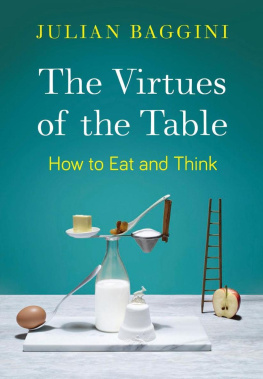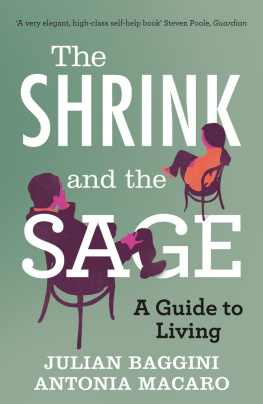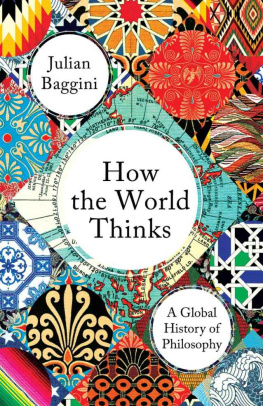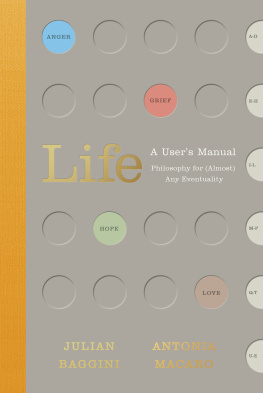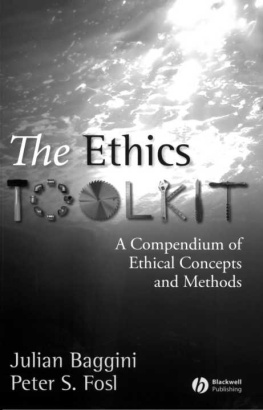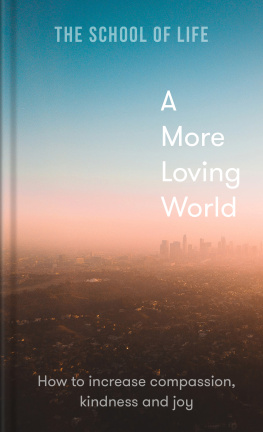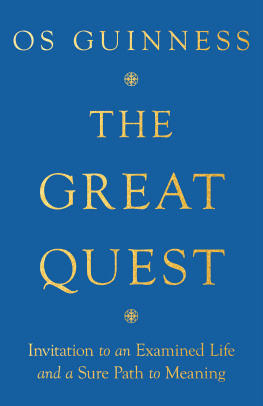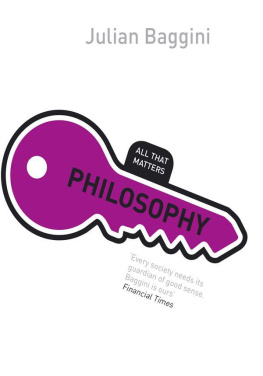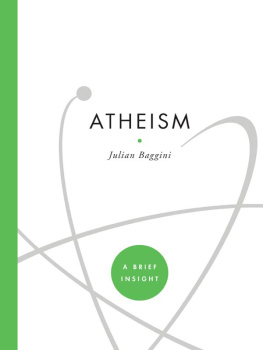What's It All
About?
What's It All
About?
Philosophy and the
Meaning of Life
Julian Baggini






Acknowledgements
The two people who require thanking above all others are Lizzy Kremer and George Miller, without both of whom this book would not have seen the light of day, nor deserved to.
I can't bring myself to list the others I need to thank without pointing out a curious purpose the list of acknowledgements seems to have, especially in academic journals. Often it seems to be a means of signalling to the wider world how important and well connected the author is. There should always be at least two or three intellectual heavyweights in the list of people thanked, just to show the good company the author keeps.
Let me just say, then, that this list does not describe my social circle, but simply lists those who have responded to requests for information or otherwise helped me out, in ways great or small. They are Nicholas Fearn, Mathew Iredale, Oliver James, Jonathan Ree, John Shand, Jeremy Stangroom and Galen Strawson. Thanks also to Sajidah Ahmad, Gillian Kemp, Lesley Levene, Alison and David Worthington and Louise Campbell. If I've left anyone out, I'm very sorry. I have a feeling my memory isn't as good as it used to be, but to be honest, I can't remember how good it used to be.
Contents
I
What's It All
About?
Introduction
'You're T S. Eliot,' said a taxi driver to the famous poet as he stepped into his cab. Eliot asked him how he knew. 'Ah, I've got an eye for a celebrity,' he replied. 'Only the other evening I picked up Bertrand Russell, and I said to him, "Well, Lord Russell, what's it all about?" And, do you know, he couldn't tell me.'
On which man is the joke in this true story? Is it Lord Russell, the great philosopher, who despite all his supposed intelligence and wisdom was unable to answer the cabby's question? Surely if anyone can tell us'what it's all about', the world's greatest living philosopher can? Or is it the taxi driver, who expected to hear the solution to such a big problem in the course of a short journey? Even if Russell knew the answer, wouldn't it require time and patience to explain the secrets of the universe?
Perhaps the best answer is that neither man merits mockery. Certainly not Russell, for if it were possible to answer the question properly in ten minutes someone would already have publicly done so and the taxi driver would not have needed to ask. But nor should we mock the taxi driver for his ignorance. His question is one almost everyone asks at some point.
The problem is that it is vague, general and unclear. It is not so much a single question but a place-holder for a whole set of questions: Why are we here? What is the purpose of life? Is it enough just to be happy? Is my life serving some greater purpose? Are we here to help others or just ourselves?
What's it all about?
To answer these questions I believe we need to undertake a rational, secular inquiry. By 'secular' I do not mean 'atheist'. I mean simply that our arguments must not start from any supposed revealed truths, religious doctrines or sacred texts. Instead they must appeal to reasons, evidence and arguments that can be understood and assessed by all, whether they have a faith or not. This is because even for many believers, the authority of established religions cannot be taken as absolute. As we understand the great diversity of faiths in the world, the historical events and forces that shaped their doctrines and sacred texts, and the fallibility of many of their leaders, the idea that they provide direct access to absolute truth loses its credibility. Divinely inspired or not, the human hand is all too clearly present. That means that even if we do believe, we cannot accept religious teachings unquestioningly. We must use our own intelligence to determine for ourselves whether or not the answers they provide stand up. And because at some stage most of us can't help but wonder what it's all about, we can't avoid this kind of philosophizing for ever.
The subject may appear to be so difficult and deep that even to attempt to write a book on it is hubristic. That accusation could be made against me if I were claiming that the'meaning of life' is a kind of secret that only the select few can discover through contemplation, revelation or a lifetime of intellectual inquiry. Such promises imply that the meaning of life is like a piece of knowledge that, once discovered, unlocks all the mysteries of life and explains everything. And because quite clearly the vast majority of us don't have any knowledge of this big secret, one needs to be especially wise to have uncovered it.
I think this whole idea is bogus and expect most readers would agree. If there were such a big secret, word would probably have got round by now. The whole problem of life's meaning is not that we lack any particular piece of secret information that would allow us to understand it; the question is not one that can be solved by any discovery of new evidence. It is rather to be solved by thinking about the issues on which the evidence remains silent. Much of what is to follow will, I hope, demonstrate this.
Hence I would describe the account of the meaning of life given in this book as 'deflationary', in that it reduces the mythical, single and mysterious question of 'the meaning of life' to a series of smaller and utterly unmysterious questions about various meanings in life. In this way it shows the question of the meaning of life to be at the same time something less and something more than it is usually taken to be: less because it is not a grand mystery beyond the reach of most of us; and more because it is not one question but many.
These questions can be answered, not because I possess exceptional wisdom, but simply by drawing together the wisdom of the greats of the past. In selecting and presenting their ideas, however, I am necessarily presenting a personal view and not just a dispassionate survey of what philosophers have to say. This is one person's account, albeit one with which I hope the majority of philosophers would mostly agree.
Anyone embarking on a quest to discover the meaning of life could do worse than heed the warning of Douglas Adams's The Hitch Hiker's Guide to the Galaxy. In this story, a race of beings fed up with bickering over the meaning of life decide to build a supercomputer to provide them with the answer. Deep Thought, as it is known, takes seven and a half million years to provide an answer to the question of 'life, the universe and everything'. On the day of reckoning, with'infinite majesty and calm', Deep Thought finally gives its verdict: 'Forty-two.'
The trouble is that the designers of the computer demanded an answer to'the question of life, the universe and everything' without bothering to ask whether they really knew what this question was. Now they have the answer, they don't understand it because they don't know what it is an answer to. Asking the right questions is as important as giving the right answers.

